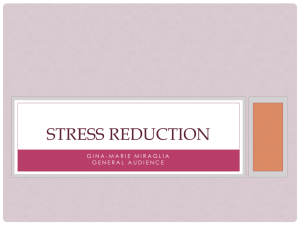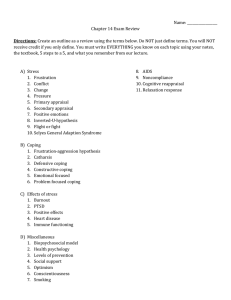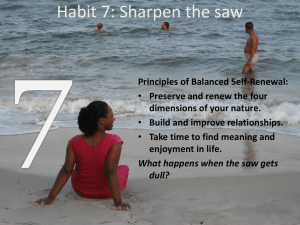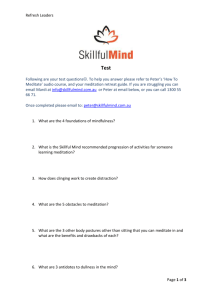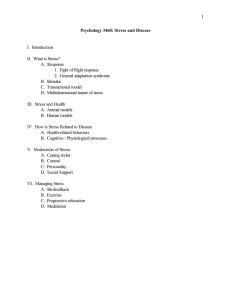Stress Management - Change for Health
advertisement
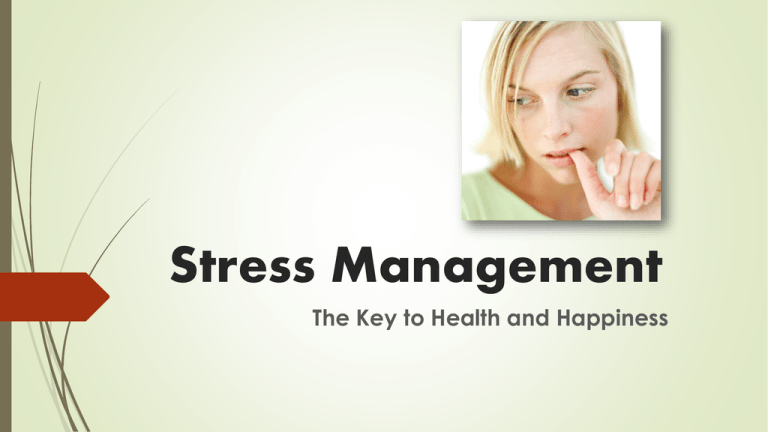
Stress Management The Key to Health and Happiness Stress Basics: Stress is a normal psychological and physiological reaction to everyday demands. Everyone at some point experiences stress. There are different kinds of stress: Eustress (positive) and Distress (negative) Eustress can be motivating, is short term, feels exciting, can improve performance, should be perceived within coping abilities. Distress can cause anxiety, can be short-term or long-term, perceived outside of coping abilities, it decreases performance, and can lead to physical and mental ailments. Learning to Manage stress Damage to the body is experienced when stress is not shut off and has become chronic. Learning to shut off Distress is important in safeguarding the health of mind, body, and spirit. Chronic stress can also have an impact on relationships, job performance, and personal potential. The key is making stress management a goal and keeping track of stress levels. Recognizing the signs of stress Not everyone reacts to stress the same way. Appetite may be suppressed or increased. Sleep may be affected, some experience insomnia and others cannot get enough sleep. Signs of Stress Low energy, headaches, upset stomach, diarrhea, neasea, aches, pains, tense muscles, rapid heartbeat, frequent colds and infections, loss of sexual desire. Stress Management Techniques Relaxation Techniques meditation, deep breathing, aroma therapy, massage therapy Nutrition and Diet Exercise Journaling Professional Counseling or Therapy Effective Time management skills CAM (Complementary and Alternative medicine) Natural Products, Mind and Body Practices Relaxation Techniques Meditation • http://www.mayoclinic.org/tests-procedures/meditation/in-depth/meditation/art20045858 Deep breathing • http://www.webmd.com/balance/stress-management/stress-management-breathingexercises-for-relaxation Aroma therapy • http://www.aromatherapy.com/ Massage therapy • http://www.webmd.com/balance/massage-therapy-styles-and-health-benefits Nutrition and Diet Stress eating usually includes food choices that are not healthy for the body. Many choices can cause more harm in the long term. Caffeine: Impacts hormones in the body Adenosine – increases alertness but future sleep problems Adrenaline – extra boost of energy but then fatigued Cortisol – stress hormone causes craving of fatty foods Dopamine – feel good then dependence and possibly addiction http://www.stress.org.uk/files/combat-nutritional-stress.pdf Exercise Exercise is a great way to reduce stress! The release of feel-good endorphins which pump up the “happy” factor. Focusing on body movement decreases stressful thoughts which can boost energy and optimism. It can improve mood by increasing self-confidence and lowering depression and anxiety. There are many way to exercise, the key is finding the one right for you! http://www.mayoclinic.org/healthy-lifestyle/stress-management/in-depth/exercise-and-stress/art20044469 Journaling Journaling has gained a lot of evidence as being a way to keep healthy. There is scientific evidence that supports unexpected benefits. The act of writing accesses the left brain which is analytical and rational. This allows the right brain freedom to be creative, and feel emotion. Removes mental blocks to better understand self, others, and the world. Professional Counseling or Therapy Many people find it hard to begin meeting with a professional counselor. The social stigma that is perceived makes it difficult to reach out and get help when needed. A healthy person is one who realizes when they need a hand. Professional counselors can help a person identify goals and potential solutions to emotional turmoil. They have skills to improve communication and coping skills. They assist in strengthening self-esteem. Counselors promote behavior change and superior mental health. http://www.counseling.org/aca-community/learn-about-counseling/what-is-counseling/overview Effective Time Management Healthy time management is important in coping with stressors of everyday life. Learning how to manage time more effectively will make you feel more relaxed, focused, and in control. Work out your goals, who you want to be, life priorities, personal achievements. Make a single “to do” list. Have a lunch break at least 30 minutes or more. Prioritize important tasks Practice the 4 D’s for emails http://www.nhs.uk/conditions/stress-anxiety-depression/pages/time-management-tips.aspx CAM: Complementary and Alternative Medicine Complementary Alternative Medicine Refers to using a non-mainstream approach in addition to Conventional medicine Refers to using a non-mainstream approach instead of Conventional medicine Natural Products Mind and Body Practices Herbs/Botanicals Biofeedback Such as Echinacea http://nccam.nih.gov/health/supplement s/wiseuse.htm Vitamins and Minerals For example fish oil/Omega 3’s http://www.cdc.gov/nutrition/everyone/b asics/vitamins/ Probiotics Helpful bacteria http://nccam.nih.gov/health/probiotics/i ntroduction.htm Acupuncture Massage therapy Meditation Relaxation techniques Spinal Manipulation Tai Chi and qi gong Yoga References: Mayo Clinic (2014). Stress Relief. Healthy Lifestyle: Stress Management. Retrieved September 29, 2014 from http://www.mayoclinic.org/healthy-living/stressmanagement/basics/stress-relief/hlv-20049495 http://psychcentral.com/lib/the-health-benefits-ofjournaling/

